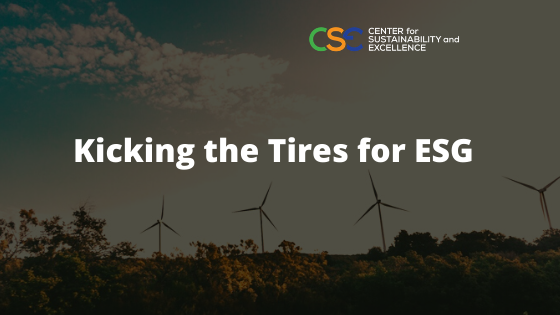By Nikos Avlonas
President and Founder of CSE
When addressing Sustainability Reporting, CSE is often asked, “what should my company report?” We answer “the issues most material to the product or service you provide.”
“How do I know what’s most material?” Ask your stakeholders.
“What if I don’t have the resources for that?” Check out what others are saying about your industry.
Those doing due diligence on your company have clear material considerations in mind. Investors, watch dogs, insurance companies, regulators, the media and B2B are kicking your ESG (environment, social, governance) tires, checking the pressures undermining your stability and the ones you are embracing as opportunities.
Addressing material issues from a financial perspective, SASB – the Sustainability Accounting Standards Board – brought together industry experts to develop sector and subsector specific material issues and reporting guidance. Materiality even within a sector can vary widely. As per SASB, access and affordability are integral to managed care, less for biotech, both subsectors within Health Care. While SASB’s Materiality Map is immensely helpful, nothing replaces asking your stakeholders what issues affect their decision making.
For all sectors, many material issues relate to climate change, whether production, supply chain or transportation (to name a few). TFCD – the Task Force on Climate-related Financial Disclosures – provides guidance on climate-related financial risk disclosures. The focus is on transparency. The information provided informs investors, lenders, insurers, and other stakeholders. TCFD considers physical, liability and transition risks associated with climate change, also addressed by sector with a growing library of case studies.
For publicly traded companies, these disclosures inform your ESG ratings with agencies such as CSRHub, MSCI, Bloomberg and a hundred others. Impartial algorithms gather information on your company to score you against competitors. For privately held companies, there are a host of due diligence professionals, such as associates at CSE, well versed in finding the surface dents and dings which raise concerns for more serious problems. You can control the narrative with public disclosures, GRI-based sustainability reports and well-stated sustainability strategies and implementation.
SASB and TCFD are the current hot sources for sustainability information on a company. To better understand how they affect you and how you can use them to your advantage, CSE’s Sustainability Academy has put together an Online Certificate on SASB and TCFD: Identifying, Evaluating and Reporting on Sustainability and Climate Risk, accepting enrollments starting June 2020.







